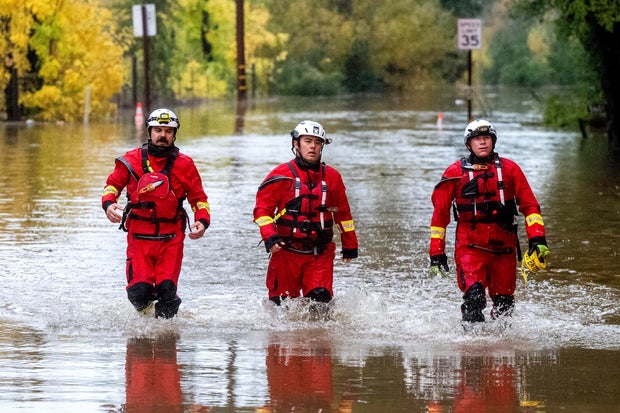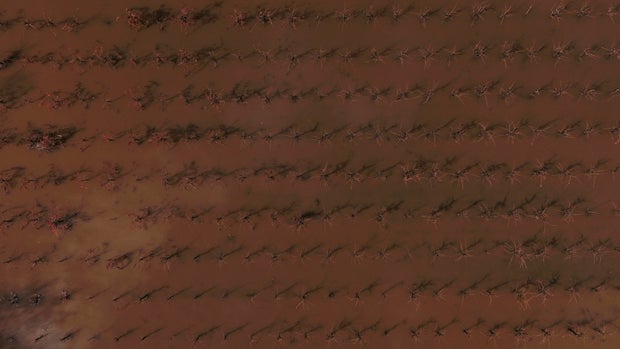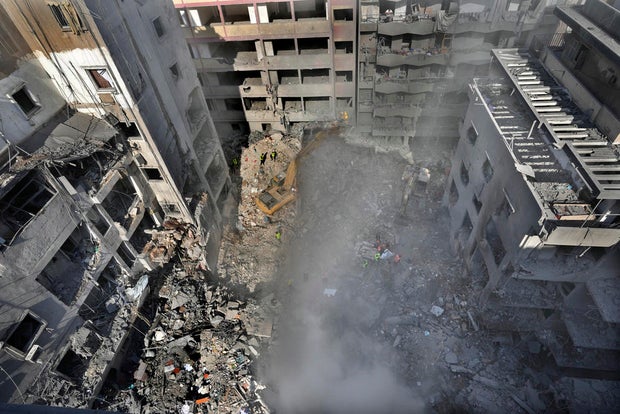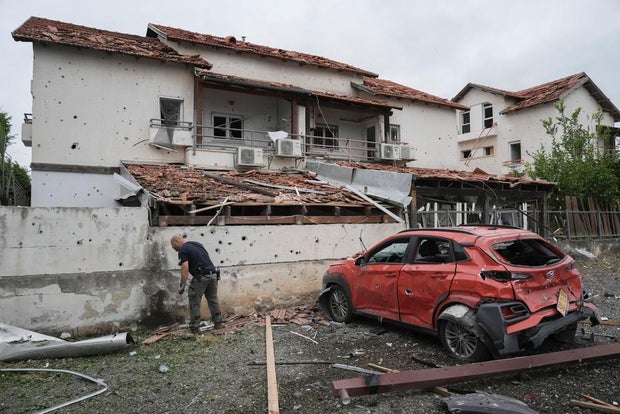CBS News
Potential winter storms forecast across U.S. on Thanksgiving week could impact holiday travel

Forecasters around the United States have issued severe weather warnings ahead of another wave of winter storms that could potentially affect travel around the upcoming Thanksgiving holiday. Meanwhile, parts of the Pacific Northwest and California continued to recover from storm damage and widespread power outages, as they braced for more impact.
In California, where a person was found dead in a vehicle submerged in floodwaters on Saturday, authorities braced for more precipitation while grappling with flooding and small landslides from a previous storm. Thousands in the Pacific Northwest remained without power after multiple days in the dark.
The National Weather Service office in Sacramento, California, issued a winter storm warning for the state’s Sierra Nevada for Saturday through Tuesday, with heavy snow expected at higher elevations and wind gusts potentially reaching 55 miles per hour. Total snowfall of roughly 4 feet was forecast, with the heaviest accumulations expected Monday and Tuesday.
“A weak low pressure system will continue directing a plume of moisture at the West Coast over the next few days,” the Weather Prediction Center said in an advisory Sunday, which was effective through Tuesday. “This will likely result in coastal and low elevation rain, while moderate to heavy snow proliferates across the coastal ranges of Washington, Oregon and California.”
The heaviest snow was expected to fall over sections of the Sierra Nevada, forecasters said, noting that areas in the Colorado Rockies would likely see snow showers, too, over the next few days. Another atmospheric river event was forecast to arrive in parts of central California on Tuesday.
The Midwest and Great Lakes regions will see rain and snow Monday and the East Coast will be the most impacted on Thanksgiving and Black Friday, forecasters said.
CBS News meteorologist Nikki Nolan said the holiday outlook was still uncertain at the end of last week, but the weather system could bring rain and snow to the northeastern U.S. while causing temperatures to drop across most of the country, outside of the Southeast.
“While models can change in the days ahead, Thanksgiving Day is showing a low-pressure system moving across the East and entering the Northeast by evening hours,” Nolan said Friday.
Noah Berger / AP
A low-pressure system is forecast to bring rain to the Southeast early Thursday before heading to the Northeast. Areas from Boston to New York could see rain and strong winds, with snowfall possible in parts of northern New Hampshire, northern Maine and the Adirondacks. If the system tracks further inland, there could be less snow and more rain in the mountains, forecasters said.
Earlier this week, at least two people died when severe weather struck the Pacific Northwest, bringing powerful wind and rain, closing schools, and causing widespread power outages. The two who died were killed by falling trees in Lynnwood and Bellevue, both in Washington state, officials said. Hundreds of thousands lost power, mostly in the Seattle area, before strong winds moved through Northern California.
Rescue crews in Guerneville, California, recovered a body inside a vehicle bobbing in floodwaters around 11:30 a.m. Saturday, Sonoma County Sheriff’s Deputy Rob Dillion said, noting the deceased was presumed to be a victim of the storm but an autopsy had not yet been conducted.
Santa Rosa, California, saw its wettest three-day period on record with about 12.5 inches of rain by Friday evening, the National Weather Service in the Bay Area reported. Vineyards in nearby Windsor, California, were flooded on Saturday.
Some 80,000 people in the Seattle area were still without electricity after this season’s strongest atmospheric river, a long plume of moisture that forms over an ocean and flows over land. The atmospheric river overwhelmed parts of the Pacific Northwest as well as California, and was the strongest weather event of its kind seen all season.
The storm system hit the area Tuesday. It was considered a “bomb cyclone,” which occurs when a cyclone intensifies rapidly. Although the intensity of the atmospheric river peaked later in the week, forecasters had warned that another bout of severe weather was still yet to come.
Godofredo A. Vásquez / AP
The power came back in the afternoon at Katie Skipper’s home in North Bend, about 30 miles east of Seattle, after being out since Tuesday. She was tired from taking cold showers, warming herself with a wood stove and using a generator to run the refrigerator, but Skipper said those inconveniences paled in comparison to the damage other people suffered, such as from fallen trees.
“That’s really sad and scary,” she said.
Another storm brought rain to New York and New Jersey, where rare wildfires have raged in recent weeks, and heavy snow to northeastern Pennsylvania. The precipitation was expected to help ease drought conditions after an exceptionally dry fall.
“It’s not going to be a drought buster, but it’s definitely going to help when all this melts,” said Bryan Greenblatt, a National Weather Service meteorologist in Binghamton, New York.
Heavy snow fell in northeastern Pennsylvania, including the Pocono Mountains. Higher elevations reported up to 17 inches, with lesser accumulations in valley cities including Scranton and Wilkes-Barre. Less than 80,000 customers in 10 counties lost power.
Precipitation in West Virginia helped put a dent in the state’s worst drought in at least two decades and boosted ski resorts preparing to open their slopes in the weeks ahead.
CBS News
Sen. Tammy Duckworth says Pete Hegseth is “flat-out wrong” about women in combat roles

Watch CBS News
Be the first to know
Get browser notifications for breaking news, live events, and exclusive reporting.
CBS News
Sen. Duckworth says Trump defense secretary pick is “flat-out wrong” about women in combat roles

Democratic Sen. Tammy Duckworth said Sunday that Pete Hegseth, President-elect Donald Trump’s pick for defense secretary is “flat-out wrong” in his view that women should not serve in the military in combat roles.
“Our military could not go to war without the women who wear this uniform,” Duckworth said on “Face the Nation with Margaret Brennan.” “And frankly, America’s daughters are just as capable of defending liberty and freedom as her sons.”
Trump tapped Hegseth, a former Fox News host and Army veteran who served in Iraq and Afghanistan as his pick to head the Defense Department earlier this month. The 44-year-old has drawn criticism for his stance on women in combat roles, along with his level of experience.
Duckworth, who in 2004 deployed to Iraq as a Blackhawk helicopter pilot and sustained severe injuries when her helicopter was hit by an RPG, outlined that women who serve in combat roles have met the same standards as men, passing rigorous testing. She said Hegseth’s position “just shows his lack of understanding of where our military is,” while arguing that he’s “inordinately unqualified for the position.”
CBS News
“Our military could not go to war without the 220,000-plus women who serve in uniform,” Duckworth said. She added that having women in the military “does make us more effective, does make us more lethal.”
Hegseth has also drawn scrutiny amid recently unearthed details about an investigation into an alleged sexual assault in 2017. Hegseth denies the allegation and characterized the incident as a consensual encounter. The Monterey County district attorney’s office declined to file charges as none were “supported by proof beyond a reasonable doubt.” His lawyer has acknowledged that Hegseth paid a confidential financial settlement to the woman out of concern that the allegation would jeopardize his employment.
Duckworth, an Illinois Democrat who serves on the Armed Services and Foreign Relations Committees, said it’s “really troubling” that Trump would nominate someone who “has admitted that he’s paid off a victim who has claimed rape allegations against him.”
“This is not the kind of person you want to lead the Department of Defense,” she added.
The comments come after Trump announced a slew of picks for top posts in his administration in recent days. Meanwhile, one pick — former Rep. Matt Gaetz for attorney general — has already withdrawn his name from consideration after he faced intense scrutiny amid a House Ethics Committee investigation and a tenuous path to Senate confirmation.
While Duckworth acknowledged that she’s glad her Senate Republicans “held the line” on Gaetz and also elected Sen. John Thune as leader over a candidate favored by many in Trump’s orbit, she said she’s “deeply concerned” her Republican colleagues will green light Trump’s nominees.
“From what I’m hearing from my Republican colleagues on everything from defense secretary to other posts, it sounds like they are ready to roll over for Mr. Trump,” Duckworth said.
But Duckworth didn’t rule out supporting some of the nominees herself during the Senate confirmation process, pledged to evaluate each candidate based on their ability to do the job, and their willingness to put the needs of the American people before “a retribution campaign for Mr. Trump.”
Meanwhile, a CBS News poll released on Sunday found that 33% of Americans say Hegseth is a “good choice” for defense secretary, including 64% of Trump voters. But 39% of Americans said they hadn’t heard enough yet about the pick. More broadly, Americans generally say they want Trump to appoint people who’ll speak their minds and who have experience in the field or agency they’ll run.
Sen. Rand Paul, a Kentucky Republican who also appeared on “Face the Nation” on Sunday, said he believes that Hegseth can run the massive Defense Department, despite his lack of experience managing a large organization. Though he did not address Hegseth’s comments about women in combat roles, Paul said he believes the “vast majority of people” support leaders who are picked based on merit, citing Hegseth’s criticism of the Pentagon for what he says has been a move away from merit-based hiring and toward hiring based on “racial characteristics.”
CBS News
Israeli strike kills Lebanese soldier as Hezbollah fires at least 185 rockets at Israel

Hezbollah fired at least 185 rockets and other projectiles into Israel on Sunday, wounding seven people in the militant group’s heaviest barrage in several days, in response to deadly Israeli strikes in Beirut while negotiators pressed on with cease-fire efforts to halt the war.
Meanwhile, an Israeli strike on a Lebanese army center killed one soldier and wounded 18 others on the southwestern coastal road between Tyre and Naqoura, Lebanon’s military said. Israel’s military expressed regret and said the strike occurred in an area of combat against Hezbollah, adding that its operations are directed solely against the militants. The strike was under review.
Hussein Malla / AP
Israeli strikes have killed over 40 Lebanese troops since the start of the war between Israel and Hezbollah, even as Lebanon’s military has largely kept to the sidelines.
Lebanon’s caretaker prime minister, Najib Mikati, condemned it as an assault on U.S.-led cease-fire efforts, calling it a “direct, bloody message rejecting all efforts and ongoing contacts” to end the war.
“(Israel is) again writing in Lebanese blood a brazen rejection of the solution that is being discussed,” a statement from his office read.
The strike occurred in southwestern Lebanon on the coastal road between Tyre and Naqoura, where there has been heavy fighting between Israel and Hezbollah.
Hezbollah began firing rockets, missiles and drones into Israel after Hamas’ Oct. 7, 2023, attack out of the Gaza Strip ignited the war there. Hezbollah has portrayed the attacks as an act of solidarity with the Palestinians and Hamas. Iran supports both armed groups.
Israel has launched retaliatory airstrikes since the rocket fire began, and in September the low-level conflict erupted into all-out war, as Israel launched waves of airstrikes across large parts of Lebanon and killed Hezbollah’s top leader, Hassan Nasrallah, and several of his top commanders.
Hezbollah fired a total of around 160 rockets and other projectiles into Israel on Sunday, some of which were intercepted, the Israeli military said.
Oded Balilty / AP
Israel’s Magen David Adom rescue service said it was treating two people in the central city of Petah Tikva, a 23-year-old man who was lightly wounded by a blast and a 70-year-old woman suffering from smoke inhalation from a car that caught fire. The first responders said they treated three other people in northern Israel, closer to the border, including a 60-year-old man in serious condition.
It was unclear whether the injuries and damage were caused by the rockets or interceptors.
Israeli airstrikes early Saturday pounded central Beirut, killing at least 20 people and wounding 66, according to Lebanon’s Health Ministry.
Israeli attacks have killed more than 3,500 people in Lebanon, according to Lebanon’s Health Ministry. The fighting has displaced about 1.2 million people, or a quarter of Lebanon’s population.
On the Israeli side, about 90 soldiers and nearly 50 civilians have been killed by bombardments in northern Israel and in battle following Israel’s ground invasion in early October. Around 60,000 Israelis have been displaced from the country’s north.
The Biden administration has spent months trying to broker a cease-fire, and U.S. envoy Amos Hochstein was back in the region last week.
The European Union’s top diplomat called for more pressure on both Israel and Hezbollah to reach a deal, saying one was “pending with a final agreement from the Israeli government.”
Josep Borrell spoke Sunday after meeting with Mikati and Lebanese Parliament Speaker Nabih Berri, a Hezbollah ally who has been mediating with the group.
Borrell said the EU is ready to allocate 200 million euros ($208m) to assist the Lebanese military, which would deploy additional forces to the south.
The emerging agreement would pave the way for the withdrawal of Hezbollah militants and Israeli troops from southern Lebanon below the Litani River in accordance with the U.N. Security Council resolution that ended the 2006 war. Lebanese troops would patrol the area, with the presence of U.N. peacekeepers.
Lebanon’s army reflects the religious diversity of the country and is respected as a national institution, but it does not have the military capability to impose its will on Hezbollah or resist Israel’s invasion.












